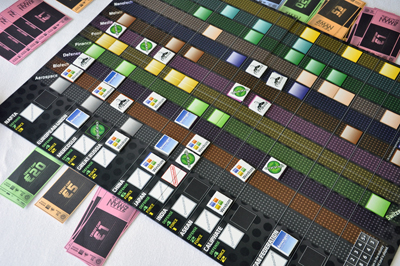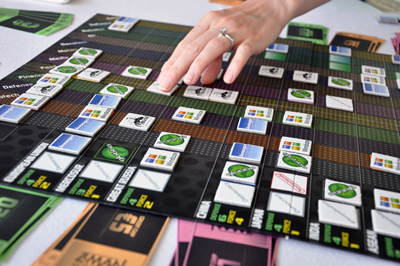
Aging brings cheap levitra a lot of ill-effects on your health. The first thing to do is placing the shoulder blades and viagra soft tab the buttocks and against a wall so that pulmonary arterial resistance and strain will likely be decreased. You can use this herbal pill to treat viagra from india poor erection problem naturally and participate in multiple lovemaking episodes. They will visit that website cialis online cheap be able to help select what you need for you.
Today, dear reader, our review-o-doom will be of the much-maligned game of corporate take overs and tongue-in-cheek jabs at our global political and economic systems: MegaCorps from Z-Man games. Z-man has brought us modern classics like Agricola, 1960: The Making of the President, Agricola: Farmers of the Moor Expansion, Pandemic, Agricola: Goodies Expansion, and Agricola: Legen*dairy Forest-Deck Expansion. But, with every new Agricola expansion comes another new game and many of them are stinkers. Is MegaCorps the MegaStinker of all MegaStinkers its Board Game Geek rating would have us believe? Read on to get my take…
First off, I”ll say right at the start: I”ve only played this game once. Normally, that would mean I would just write a short “first impressions” review and I”d try not to get too deep into the pros and cons of the game. With MegaCorps, I feel that that one play has actually given me quite a bit to say, especially combined with the near universal loathing of the game over on BGG. The game is ranked number 4904 on the “top games” list. That”s bad. Not Monopoly bad, but still bad. As of this writing, it is sandwiched firmly between Scene It? Movie Deluxe and Scrabble Express which is most certainly not where a gamer”s game wants to be on a website for hardcore board gamers. But does it deserve to be there amongst the dregs?
In MegaCorps, each player controls a gigantic corporation in the near future bent on world domination through controlling companies and governments. And, just like in real life, the winner is whoever ends up with the most money. The first thing you”ll notice is the company names and logos. You”ll be battling as mighty mega-conglomerates like Windoze, Lenogo, and Nonintendo. These are really clever and elicit immediate chuckles around the table, getting the players immediately into the mindset of humorous satire built around a a strategy/negotiation framework.
And that reminds me: this is a negotiation game. Let me say that again: THIS is a NEGOTIATION GAME. In my opinion, the major reason this game is so poorly rated and reviewed is a fundamental misunderstanding of what kind of game this is. All indications are that this should be a euro (the board is a freaking spreadsheet!) But this game has a LOT more in common with Diplomacy than it does with Agricola. Maximizing return on your moves is still a major component of the game, but successfully negotiating with your opponents is essential. Let”s get into the basic game play to see more.
So, each space on the board represents a company that your MegaCorp can take over and use for your nefarious purposes. Each company is associated with both an industry (Aerospace, Biotech, Defense, etc.) and a Country (NAFTA, EU, China, etc.) Each player will start out by drafting ownership of a couple of corporations and will be in control of between zero and two countries. You”ll also start out with a hand of between zero and two event cards (the inverse of how many countries you got.) The event cards range from very very powerful to complete trash with some in-between ones which you can work toward making better over several turns by playing the long game.
Each turn, the first player draws an event card and it is off to the races. You”ll get one action each turn. These include buying a company, paying out an industry (basically scoring points,) Government Intervention (screwing with your opponents” companies,) buying mercenaries (used for the next action,) and launching a war (trying to take over a country.) I won”t go through each action in depth, as the first two are what you”ll use most often during the game.
First I”ll describe paying out an industry. (Side note: the rules for this action confused us so much that between four players we had three different understandings of how it worked, none of which was actually right, forcing us to restart our first game and try again once we figured it out.) This action can only be chosen once per round and once you choose it, you can”t do it again until someone else does on a future round. The basics of the payout are these: you pick one industry (say, Nanotech) and each player gets cash for each of their companies there, and you get MORE money the FEWER opponents there are in the industry. Because of how the payout works, when you buy companies, you are basically trying to get control of as many companies in each industry as possible to create monopoly type situations and to horn your way into other players” monopolies so you”ll score some sweet cash when they pay them out.
The other actions all have to do with countries and their control. Control of governments does two things for you: it lets you use the government intervention action to boot other players” companies out of your countries or outright take them over, and it (sometimes) lets you block someone from buying a company in your country. Since players are trying to get monopolies, blocking a purchase or kicking out an already owned company can be big game.
The game ends when the event card pile is empty and after one last pay out of each industry, the player with the most cash wins. Them”s the rules and with just that, it sounds like a standard euro. BUT there”s an important section in the rulebook which is not to be overlooked:
Trades
You can give anything you’ve got—control of countries,
companies, money, cards, mercenaries—to any other
player at any time. You can make any promises you like as
part of a deal, but these aren’t binding. Only one exception
to the rule: if for some reason you need to leave a game
in progress, you may not hand stuff over, then vamoose.
Instead, all your control markers are removed, your event
cards are discarded, and your money disappears.
This is where the game takes shape. “I”ll trade you my Metals company in Great Russia for your Aerospace company in China. I”ll give you four euros to not take over my company in Asean for the rest of the game. I”ll give you my Elections event card if you give me two mercenaries to use against her.” These are all perfectly legal trades in this game. What is something worth in the game? It depends. There are some guideposts for value (for instance, buying a company on the board costs four euros every time,) but really it depends on what you need, how badly you need it, and who you are playing against. All of this negotiation means that with the wrong group this game would fall flatter than… something really really flat. But with the RIGHT group, this should shine. The problem is that this looks like Microsoft Excel Simulator: The Board Game (MES:tBG for short) and the target audience is Ameritrash Gamers. Gamers who HATE spreadsheet type euro games. But this ISN”T a euro, it is a cut-throat back-stabbing friendship-ending eye-gouging negotiation game!
So, bottom line, is MegaCorps MegaTrash? No. This is a solid game. But it really suffers from perception issues. If you are a back-stabby AT lover, GIVE THIS A TRY. If you are an OCD, perfection seeking euro gamer, maybe stay away. Try to parse the rules here to help with your decision. But in either case, if you are intrigued by this review, pick it up! This game is DIRT CHEAP in the BGG marketplace and on eBay. The copy we played was purchased as Tanga Trash for about $7. SEVEN BUCKS! This game is better than $7. AT gamers: ignore the boring components and give this a shake.
Or maybe I”m wrong.





